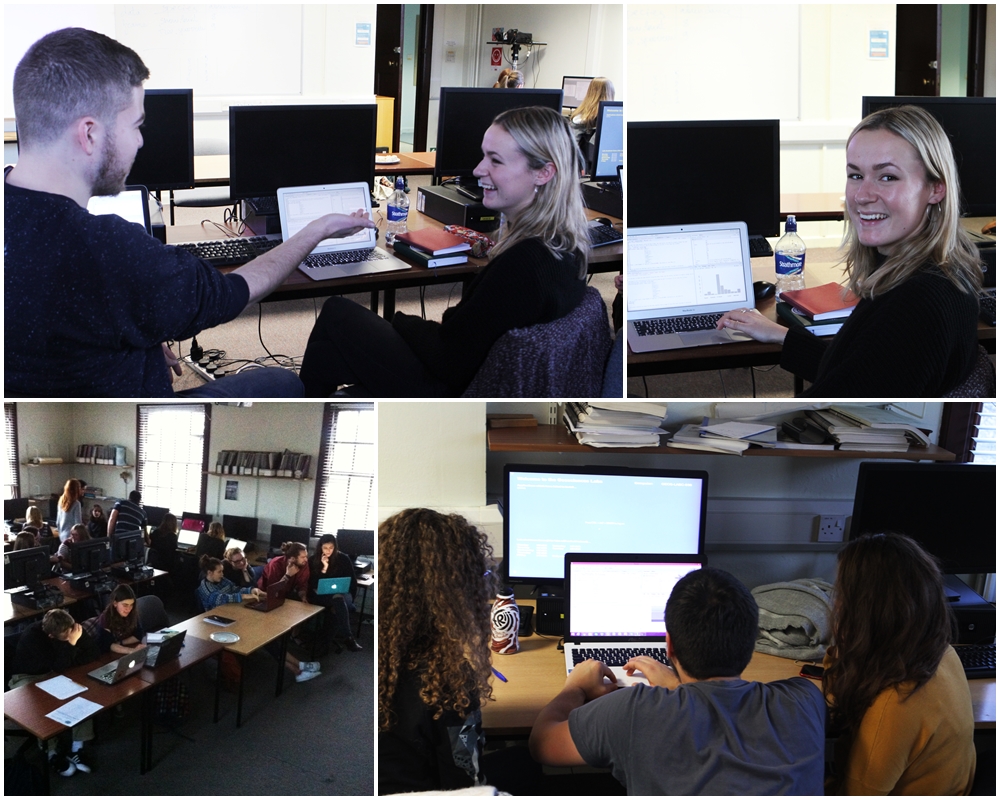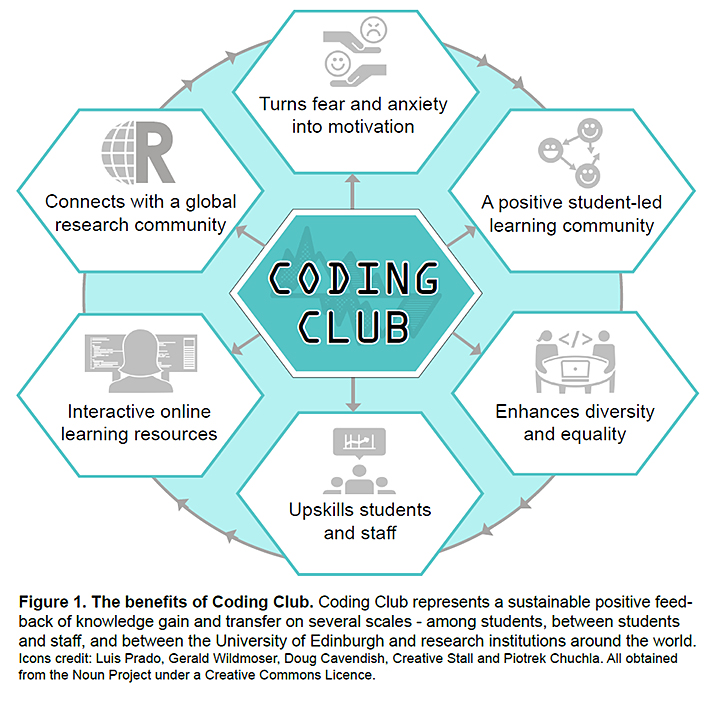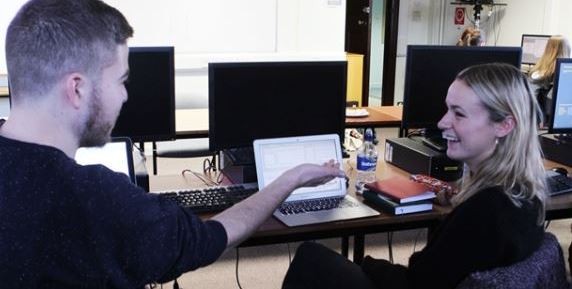Coding Club is a positive peer-to-peer learning community aiming to develop quantitative skills, in particular fluency in statistics and the programming language R, through fostering a supportive environment where we can all grow as teachers and learners together. Coding Club brings together undergraduate students, recent alumni, PhD students and researchers from the University of Edinburgh for weekly peer-led workshops to deliver a meaningful and motivational learning experience.
Excelling at quantitative analysis is often hindered by statistics anxiety – worry about a lack of quantitative skills – and code fear – the fear of programming – both of which are particularly prevalent among women and minorities. Lack of motivation to bravely work through error messages is a core barrier to mastering statistics and programming. To remedy this problem, our team has been cultivating an ethos of continuous peer support and encouragement. We encourage wide participation from students and staff members by creating a safe place to ask questions, engage in team work and answer exciting research questions. We believe that equality, diversity and inclusion are an integral part of good teaching (see a previous post the author has written about what makes good teaching) and are committed to providing innovative learning opportunities for everyone. Our first workshops, led by alumni and PhD students, were attended by undergraduate and PhD students from the Schools of Biological Sciences and GeoSciences, thus launching a diverse community of people at different career stages, all keen to gain quantitative skills.
Analysing Edinburgh’s biodiversity and getting familiarised with coding – how to import and explore data, make figures and find help online.
Students are at the forefront of our initiative – by leading workshops, students gain valuable teaching experience, and by closely working with class representatives, we tailor our workshops to student needs. Coding Club aims to provide graduates with the appropriate statistical and coding skills for their future careers in business, consulting, government or academia. Our weekly workshops cover a wide range of topics, and students can attend sessions of their choice, thus building the skill set that is most relevant to their interests. We are also preparing a series of challenges, fun team competitions and games which we will use to demonstrate that even the driest, usually most detested subject – statistics – can deliver a positive learning experience.
We are striving for good and innovative teaching – our initiative is unique in dovetailing supportive in-person and interactive online learning to create an engaging platform that delivers maximum educational benefit (see Figure 1). Our workshops provide an added benefit to quantitative training within the School of GeoSciences, as provided by excellent courses like Professional Skills for Ecological and Environmental Sciences (organised by Dr Kyle Dexter) and Conservation Science (organised by Dr Isla Myers-Smith and Dr Aidan Keane – the course blog can be browsed online) as well as an interactive VLE (Virtual Learning Environment), created by Dr Christina Coakley and Dr Kyle Dexter. Students can participate in workshops in-person on Wednesdays 2-4pm at Crew 301, or online at their convenience through our website.

Here’s what students say about Coding Club:
“Easy to understand, everyone is very friendly and approachable.”
“I like how engaged and motivated all of the tutors are and the fact that they provide help individually to everyone.”
“The tutors are keen and engaging, their enthusiasm rubs off on all of us. The step-by-step tutorials are useful for going back over things once the session is over. Having people who’ve relatively recently learnt to code as tutors is great because they are good at explaining things from an approachable perspective. The peer-led nature of the classes is a forgiving, non-threatening atmosphere to ask questions and make mistakes.”
We want to create a vibrant and diverse community where everyone has a voice and feels comfortable to express it. Coding Club is a place that brings people together, regardless of their background. We all have the right to learn, and we believe learning is more fun and efficient when we help each other along the way. The Coding Club model of peer-instruction with the support of highly-qualified staff members is transferable across all disciplines incorporating quantitative analysis – we have been sharing our experience so far on our blog and Twitter account and welcome any questions or feedback.




I’m a PhD of plant physiology in China, in my study, lots of figures and statistics need be done. I have made a few figures by R. To be honest, I just know the software and it is difficult for me to get the figures I want. The first problem maybe the lack of logic, when I meet obstacle, especially I can’t get solution quickly, then I will be depressed and want to give up. The second problem is the lack of environment that colleagues work by coding. So I think that the community is suitable for me. Let’s learn R language together.